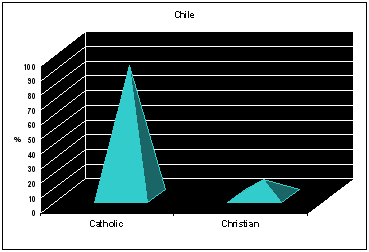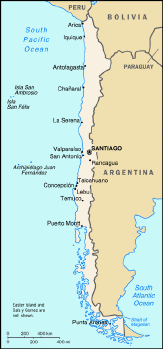 |
|
Chile
Introduction
Chile
has a population of nearly 14 million people with
almost 5 million located in the capital city, Santiago.
It has an ethnic composition of 95 percent mestizo
(of mixed European and Indian blood), 3 percent
Indian (mostly Araucanian), and less than 2 percent
are solely of European descent. Because of the
geography of the area, the country has experienced
a large degree of isolation and, as a result, is
more ethnically homogeneous than most of South
America. The Republic of Chile is a multiparty
republic with two legislative houses, the 48-seat
Senate and the 120-seat Chamber of Deputies. The
president is the chief of state as well as the
head of government.
The
official language is Spanish, although English
is spoken by well-educated business people and
in tourist centers. There is no official religion,
however approximately 78 percent identify themselves
as Roman Catholics, and about 13 percent are Protestants.
There is a large number of people that consider
themselves atheist.
|
|
Chile
Fun Fact
Chile
is the world’s longest country – north
to south. Chileans have a renowned reputation for
achievement in many cultural fields. Literature,
social science, and fine arts are considered prestigious
areas of study. Family respect and loyalty are primary
concerns in Chile, even taking precedence over business
responsibilities. Chile has a stellar track record
for international trade. As an exporting nation,
Chile competes with countries beyond its Latin American
neighborhood. Chile was ranked 18th out
of the 49 most competitive economies in the world
by the 1996 World Competitiveness Report published
by the International Institute for Management Development
in Lausanne, Switzerland. It exports more than 3,800
diverse products to more than 170 markets worldwide.
|
| |
Geert
Hofstede Analysis for Chile
|
|
|
The Geert Hofstede analysis for
Chile is similar to it’s Latin
American neighbors. Uncertainty avoidance ranks highest which
indicates a high concern for rules, regulations,
controls and issues with
career security – typically, a society that does not readily
accept change and is risk adverse. Individualism ranks lowest
which signifies a society of a more collectivist nature and
strong relationships
where everyone takes responsibility for fellow members of their
group.
Chile is similar to many Latin American countries
when analyzing Hofstede's Dimensions.
Chile's
highest Hofstede Dimension is Uncertainty Avoidance
(UAI) at 86, indicating the society’s
low level of tolerance for uncertainty. In an effort
to minimize or reduce this level of uncertainty, strict
rules, laws, policies, and regulations are adopted
and implemented. The ultimate goal of this population
is to control everything in order to eliminate or avoid
the unexpected. As a result of this high Uncertainty
Avoidance characteristic, the society does not readily
accept change and is very risk adverse.
Chile has a low Individualism (IDV) rank of 23, as
do most Latin countries. The score on this Dimension
indicates the society is Collectivist as compared to
Individualist. This is manifest in a close long-term
commitment to the member 'group', be that a family,
extended family, or extended relationships. Loyalty
in a collectivist culture is paramount, and over-rides
most other societal rules and regulations. The society
fosters strong relationships where everyone takes responsibility
for fellow members of their group
In
many of the Latin American countries, including Chile,
the population is predominantly Catholic (see
Religions Graph below). The combination of Catholicism
and the cultural dimensions shown in the Hofstede Graphs
above, reinforce a philosophy predicated in the belief
that there is an absolute ‘Truth”. As Geert
Hofstede explains about peoples with a high Uncertainty
Avoidance Index, their attitude is, “There can
only be one Truth and we have it.” More on Geert Hofstede
Written by Stephen Taylor - the Sigma Two Group
|
Religion
in Chile

*
WORLD FACTBOOK 2011
In
a country that has over 50% of its population practicing
the Catholic religion, we found the primary correlating
Hofstede Dimension to be Uncertainty Avoidance
(UAI). There were only 2 countries out of 23 that
did not follow this correlation, they were Ireland
and the Philippines. (See accompanying Article)
|
Appearance
in Chile
 Men
customarily wear dark blue or gray suit, a light
shirt, and a conservative tie. Bright colors and
flashy fashions are not suitable, nor is wearing
anything on the lapel. Women should wear a suit
and heels Men
customarily wear dark blue or gray suit, a light
shirt, and a conservative tie. Bright colors and
flashy fashions are not suitable, nor is wearing
anything on the lapel. Women should wear a suit
and heels
 Men
should note that when a woman enters a room, the
polite gesture is to rise and be prepared to shake
her hand if she offers it. A seated woman, however,
need not rise nor is she obliged to offer her hand Men
should note that when a woman enters a room, the
polite gesture is to rise and be prepared to shake
her hand if she offers it. A seated woman, however,
need not rise nor is she obliged to offer her hand
 Chileans
converse in close proximity to one another Chileans
converse in close proximity to one another
 Maintaining
eye contact is necessary to show interest and sincerity Maintaining
eye contact is necessary to show interest and sincerity
 At
a meal, keep your hands above the table at all
times At
a meal, keep your hands above the table at all
times
 Yawns
should be stifled or covered with the hand Yawns
should be stifled or covered with the hand
 Holding
the palm upward and then spreading the fingers
signals that someone is "stupid" Holding
the palm upward and then spreading the fingers
signals that someone is "stupid"
 Slapping
your right fist into your left open palm is considered
obscene Slapping
your right fist into your left open palm is considered
obscene
 Do
not raise your right fist to head level, as this
is a Communist sign Do
not raise your right fist to head level, as this
is a Communist sign
|
| |
Behavior
in Chile
 Prior
appointments are necessary Prior
appointments are necessary
 In
business, punctuality respected. Meetings should
start and end on time In
business, punctuality respected. Meetings should
start and end on time
 Have
business cards printed with English on one side
and Spanish on the other. Present cards to everyone
in a meeting except secretaries Have
business cards printed with English on one side
and Spanish on the other. Present cards to everyone
in a meeting except secretaries
 Business
entertaining generally is done at major hotels
and restaurants Business
entertaining generally is done at major hotels
and restaurants
 Light
conversation is customary before business discussions Light
conversation is customary before business discussions
 Don’t
serve wine with your left hand. Wines, especially
white wines, are a national treasure Don’t
serve wine with your left hand. Wines, especially
white wines, are a national treasure
 Proper
table manners are important Proper
table manners are important
 Women
have advanced in professions in Chile, more so
than in most other Latin countries. However, they
will be at a slight disadvantage because of the machismo ethnic
that continues to exist Women
have advanced in professions in Chile, more so
than in most other Latin countries. However, they
will be at a slight disadvantage because of the machismo ethnic
that continues to exist
 Gifts
are not expected in business until the relationship
is a close one Gifts
are not expected in business until the relationship
is a close one
 Chileans
do not bargain in either stores or street markets.
It is illegal to sell something and not issue a
receipt Chileans
do not bargain in either stores or street markets.
It is illegal to sell something and not issue a
receipt
 Considering
sending a gift to someone in Chile? See
gifts to Chile Considering
sending a gift to someone in Chile? See
gifts to Chile
|
| |
Communications
in Chile
 With
first introductions, a handshake is the custom With
first introductions, a handshake is the custom
 Male
Chileans may greet each other with hearty hugs,
with women customarily kissing each other on the
cheek Male
Chileans may greet each other with hearty hugs,
with women customarily kissing each other on the
cheek
 Titles
are important and should be included on business
cards. Address a person directly by using his or
her title only. A Ph.D or a physician is called Doctor.
Teachers prefer the title Profesor, engineers
go by Ingeniero, architects are Arquitecto,
and lawyers are Abogado. Persons who do
not have professional titles should be addressed
as Mr., Mrs., or Miss, plus their surnames. In
Spanish these are Titles
are important and should be included on business
cards. Address a person directly by using his or
her title only. A Ph.D or a physician is called Doctor.
Teachers prefer the title Profesor, engineers
go by Ingeniero, architects are Arquitecto,
and lawyers are Abogado. Persons who do
not have professional titles should be addressed
as Mr., Mrs., or Miss, plus their surnames. In
Spanish these are
- Mr.
= Senor
- Mrs.
= Senora
- Miss
= Senorita
 Most
Hispanics have two surnames: one from their father,
which is listed first, followed by one from their
mother. Only the father’s surname is used
when addressing someone Most
Hispanics have two surnames: one from their father,
which is listed first, followed by one from their
mother. Only the father’s surname is used
when addressing someone
 Good
conversation topics: families, children, Easter
Island, history Good
conversation topics: families, children, Easter
Island, history
 Bad
conversation topics: politics, human rights, 1988
grape export scare Bad
conversation topics: politics, human rights, 1988
grape export scare
|
| |
|
|
|
|
|
HOME
PAGE
|
|
|
|
|
Resources
Geert Hofstede Free
Monthly Newsletter Resource
Page
International
Business Center
|
|
|
|
|
|

Thanks
to the UTD Global MBA graduates who work
diligently on collecting the information for this Website
|
Page authored by: Joni Nicol
|
|
|
|
|
|
|

|



